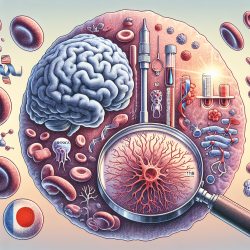The search for effective biomarkers for Alzheimer's disease (AD) has been a focal point in neurodegenerative research. Recent findings suggest that abnormalities in DYRK1A-cytoskeleton complexes within blood cells may offer a promising avenue for early diagnosis.
Understanding the Research
The study titled Abnormalities of DYRK1A-Cytoskeleton Complexes in the Blood Cells as Potential Biomarkers of Alzheimer’s Disease explores the potential of using cytoskeletal abnormalities as biomarkers. The research highlights that both Down syndrome (DS) and AD samples exhibit reduced abundance of associated cytoskeletal proteins.
Key Findings
- Cytoskeletal proteins associated with DYRK1A are markedly reduced in DS and AD cases compared to controls.
- Alterations in actin cytoskeleton are present even before the clinical onset of AD, making them suitable candidates for early diagnosis.
- The study suggests that these abnormalities are specific to AD-type dementia, distinguishing it from other neurodegenerative diseases.
Implications for Practitioners
For practitioners, these findings offer a new perspective on diagnosing and managing Alzheimer's disease. Implementing these insights could lead to earlier detection and more personalized treatment plans. Here are some ways practitioners can leverage this research:
- Early Detection: Utilize blood tests focusing on DYRK1A-cytoskeleton complexes to identify individuals at risk before clinical symptoms appear.
- Differential Diagnosis: Differentiate between AD and other forms of dementia through specific cytoskeletal markers.
- Research Participation: Encourage participation in further studies to validate these findings across diverse populations.
Encouraging Further Research
The potential of DYRK1A-cytoskeleton complexes as biomarkers is an exciting development in Alzheimer's research. Practitioners are encouraged to delve deeper into this area, contributing to a growing body of evidence that could transform diagnostic processes.
To read the original research paper, please follow this link: Abnormalities of DYRK1A-Cytoskeleton Complexes in the Blood Cells as Potential Biomarkers of Alzheimer’s Disease.










